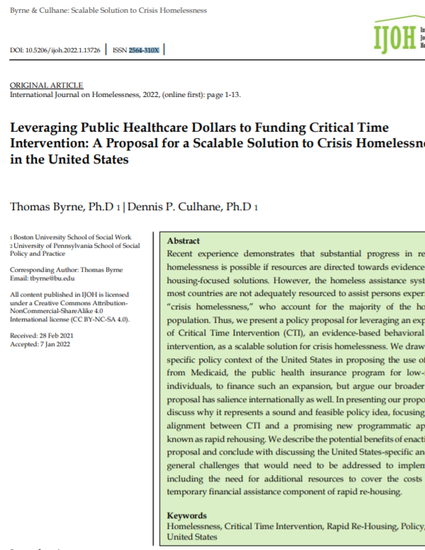
Article
Leveraging Public Healthcare Dollars to Fund Critical Time Intervention: A Proposal for a Scalable Solution to Crisis Homelessness in the United States
International Journal on Homelessness
(2022)
Abstract
Recent experience demonstrates that substantial progress in reducing homelessness is possible if resources are directed towards evidence-based, housing-focused solutions. However, the homeless assistance systems in most countries are not adequately resourced to assist persons experiencing “crisis homelessness,” who account for the majority of the homeless population. Thus, we present a policy proposal for leveraging an expansion of Critical Time Intervention (CTI), an evidence-based behavioral health intervention, as a scalable solution for crisis homelessness. We draw on the specific policy context of the United States in proposing the use of funds from Medicaid, the public health insurance program for low-income individuals, to finance such an expansion, but argue our broader policy proposal has salience internationally as well. In presenting our proposal, we discuss why it represents a sound and feasible policy idea, focusing on the alignment between CTI and a promising new programmatic approach known as rapid rehousing. We describe the potential benefits of enacting this proposal and conclude with discussing the United States-specific and more general challenges that would need to be addressed to implement it, including the need for additional resources to cover the costs of the temporary financial assistance component of rapid re-housing.
Keywords
- homelessness prevention; rapid rehousing; critical time intervention
Disciplines
Publication Date
February 3, 2022
DOI
10.5206/ijoh.2022.1.13726
Citation Information
Byrne, T., & Culhane, D. (2022). Leveraging Public Healthcare Dollars to Funding Critical Time Intervention: A Proposal for a Scalable Solution to Crisis Homelessness in the United States. International Journal on Homelessness, (online first), 1–13.
